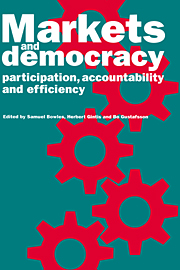16 results
Bibliography
-
- Book:
- Markets and Democracy
- Published online:
- 05 March 2012
- Print publication:
- 22 July 1993, pp 316-334
-
- Chapter
- Export citation
List of figures
-
- Book:
- Markets and Democracy
- Published online:
- 05 March 2012
- Print publication:
- 22 July 1993, pp xii-xii
-
- Chapter
- Export citation
Part IV - Productivity, distribution, and power
-
- Book:
- Markets and Democracy
- Published online:
- 05 March 2012
- Print publication:
- 22 July 1993, pp 197-198
-
- Chapter
- Export citation
Part II - Institutions and institutional change
-
- Book:
- Markets and Democracy
- Published online:
- 05 March 2012
- Print publication:
- 22 July 1993, pp 49-50
-
- Chapter
- Export citation

Markets and Democracy
- Participation, Accountability and Efficiency
-
- Published online:
- 05 March 2012
- Print publication:
- 22 July 1993
Part I - Agency, incentives, and democratic accountability
-
- Book:
- Markets and Democracy
- Published online:
- 05 March 2012
- Print publication:
- 22 July 1993, pp 11-12
-
- Chapter
- Export citation
Part V - Ownership, participation and capital markets
-
- Book:
- Markets and Democracy
- Published online:
- 05 March 2012
- Print publication:
- 22 July 1993, pp 229-230
-
- Chapter
- Export citation
Subject index
-
- Book:
- Markets and Democracy
- Published online:
- 05 March 2012
- Print publication:
- 22 July 1993, pp 338-340
-
- Chapter
- Export citation
Part III - Conditions for the success of the democratic firm
-
- Book:
- Markets and Democracy
- Published online:
- 05 March 2012
- Print publication:
- 22 July 1993, pp 127-128
-
- Chapter
- Export citation
Author index
-
- Book:
- Markets and Democracy
- Published online:
- 05 March 2012
- Print publication:
- 22 July 1993, pp 335-337
-
- Chapter
- Export citation
List of tables
-
- Book:
- Markets and Democracy
- Published online:
- 05 March 2012
- Print publication:
- 22 July 1993, pp xiii-xiv
-
- Chapter
- Export citation
Preface
-
-
- Book:
- Markets and Democracy
- Published online:
- 05 March 2012
- Print publication:
- 22 July 1993, pp xv-xviii
-
- Chapter
- Export citation
Part VI - Political democracy and economic democracy
-
- Book:
- Markets and Democracy
- Published online:
- 05 March 2012
- Print publication:
- 22 July 1993, pp 277-278
-
- Chapter
- Export citation
Frontmatter
-
- Book:
- Markets and Democracy
- Published online:
- 05 March 2012
- Print publication:
- 22 July 1993, pp i-vi
-
- Chapter
- Export citation
Contents
-
- Book:
- Markets and Democracy
- Published online:
- 05 March 2012
- Print publication:
- 22 July 1993, pp vii-xi
-
- Chapter
- Export citation
Comment
-
-
- Book:
- The Stockholm School of Economics Revisited
- Published online:
- 05 July 2013
- Print publication:
- 29 March 1991, pp 124-128
-
- Chapter
- Export citation



